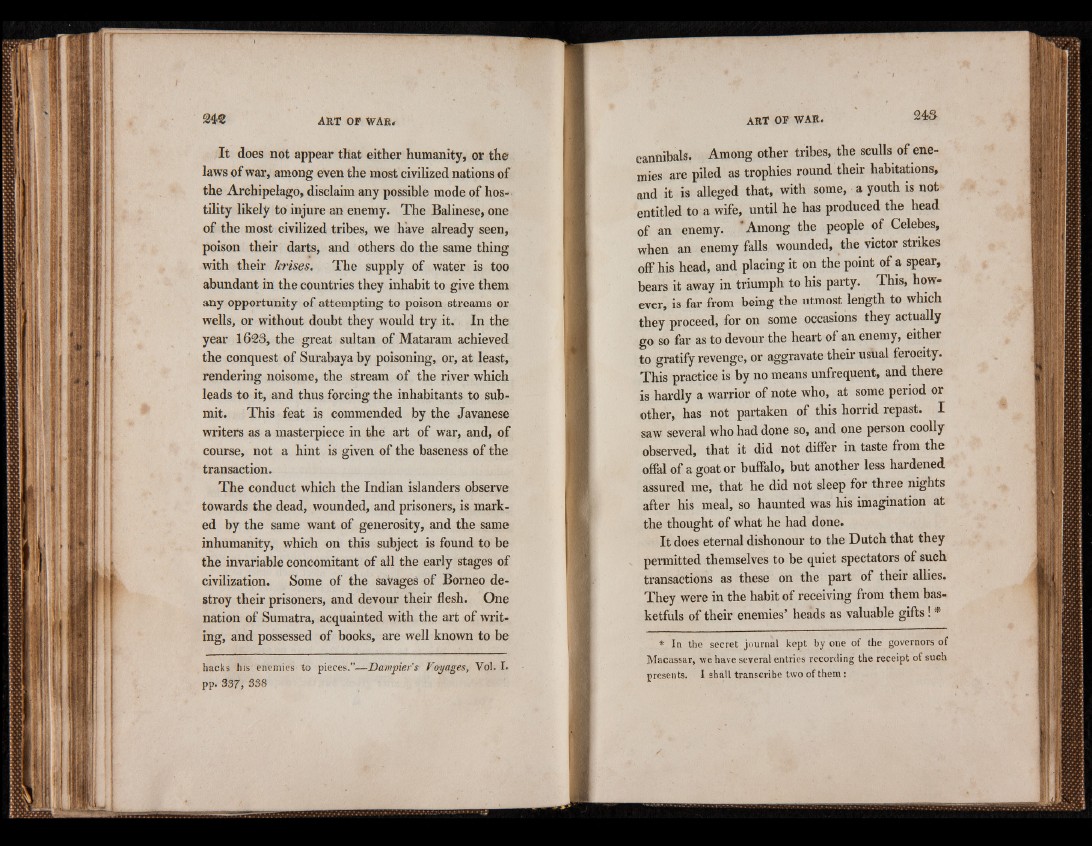
It does not appear that either humanity, or the
laws of war, among even the most civilized nations of
the Archipelago, disclaim any possible mode of hos-*
tility likely to injure an enemy. The Balinese, one
of the most civilized tribes, we have already seen,
poison their darts, and others do the same thing
with their krises. The supply of water is too
abundant in the countries they inhabit to give them
any opportunity of attempting to poison streams or
wells, or without doubt they would try it. In the
year 1623, the great sultan of Mataram achieved
the conquest of Surabaya by poisoning, or, at least,
rendering noisome, the stream of the river which
leads to it, and thus forcing the inhabitants to submit.
This feat is commended by the Javanese
writers as a masterpiece in the art of war, and, of
course, not a hint is given of the baseness of the
transaction.
The conduct which the Indian islanders observe
towards the dead, wounded, and prisoners, is marked
by the same want of generosity, and the same
inhumanity, which on this subject is found to be
the invariable concomitant of all the early stages of
civilization. Some of the saVages of Borneo destroy
their prisoners, and devour their flesh. One
nation of Sumatra, acquainted with the art of writing,
and possessed of books, are well known to be
hacks his enemies to pieces.”—Dampier’s Voyages, Vol. I.
pp. 337, 338
cannibals. Among other tribes, the sculls of enemies
are piled as trophies round their habitations,
and it is alleged that, with some, a youth is not
entitled to a wife, until he has produced the head
of an enemy. ‘Among the people of Celebes,
when an enemy falls wounded, the victor strikes
off his head, and placing it on the point of a spear,
bears it away in triumph to his party. This, how-
ever, is far from being the utmost length to which
they proceed, for oil some occasions they actually
go so far as to devour the heart of an enemy, either
to gratify revenge, or aggravate their usual ferocity.
This practice is by no means unfrequent, and there
is hardly a warrior of note who, at some period or
other, has not partaken of this horrid repast. I
saw several who had done so, and one person coolly
observed, that it did not differ in taste from the
offal of a goat or buffalo, but another less hardened
assured me, that he did not sleep for three nights
after his meal, so haunted was his imagination at
the thought of what he had done.
It does eternal dishonour to the Dutch that they
permitted themselves to be quiet spectators of such
transactions as these on the part of their allies.
They were in the habit of receiving from them basketfuls
of their enemies’ heads as valuable gifts! *
* In the secret journal kept by one of the governors of
Macassar, we have several entries recording the receipt of suGh
presents. I shall transcribe two of them: